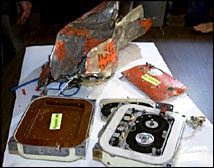 |
| Vol. 1 No. 11 | November 1999 |
 |
| The flight data recorder from EgyptAir Flight 990 |
According to investigators, Capt. Habashi left the cockpit about thirty minutes after the Boeing 767 aircraft took off from New York and left co-pilot Gameel Batouti in control of the plane. Batouti then uttered the words "I put my trust in God" (according to sources contacted by Newsweek, he said this 14 times1) and turned off the autopilot. After a few seconds, the plane then went into an extremely sharp dive from from 33,000 ft to around 16,000 ft. The plane then rose briefly for several thousand feet before falling again. At around 10,000 ft, the plane began breaking into several pieces which plummeted into the ocean.
During the dive, Capt. Habashi reentered the cockpit and attempted to pull the nose of the plane back up. He is heard yelling to Batouti "Work with me, pull with me." According to the flight data recorder, however, the elevators on the tail (devices which control altitude) were split--the left one on the captain's side in the "nose up" position and the right one on the copilot's side in the "nose down" position--implying that while Habashi was trying to pull the plane out of the dive, Batouti was attempting to continue the plunge toward the ocean. The speed brakes (metal panels on the wings that make the plane descend faster) were deployed by one of the pilots (presumably Batouti) and both of the engines were deliberately turned off (according to Boeing officials, the engines can only be shut down intentionally).
Despite the overwhelming evidence that the crash was a deliberate criminal act, the investigation has not yet been transferred to the FBI. US President Bill Clinton has indefinitely blocked this move, reportedly at the request of Egyptian President Hosni Mubarak.1 Nevertheless, two FBI agents and a psychologist are among a team of seven experts who arrived in Cairo on November 19 to investigate the backgrounds of the pilots and passengers.
Lone Suicide or Terrorist Attack?
US investigators have "a very good picture of what happened," said an FBI official last week. "The problem is why?" Was the crash of EgyptAir Flight 990 the work of a lone copilot bent on suicide or an organized terrorist organization? The investigation of Batouti has thus far uncovered no history of depression, financial problems, or other factors commonly associated with suicide.2 Moreover, Egypt's suicide rate is far lower than that of the US.
Thus far, evidence of terrorist involvement in the crash is minimal and entirely circumstantial. The secular regime of Egyptian President Hosni Mubarak has its share of enemies. The crash will certainly have a detrimental impact on Egypt's tourist industry, which has been the prime target of the country's radical Islamic movement for years. The presence on board flight 990 of 33 Egyptian military officers returning from training in the US may also have made it an attractive target.
1 "Egypt Resisted US Pressure on EgyptAir Crash," Reuters, 22 November 1999.
2 Initial reports that the health of Batouti's 10-year old daughter, who suffers from lupus, had recently failed are unfounded, according to physicians in charge of her care at UCLA medical center.